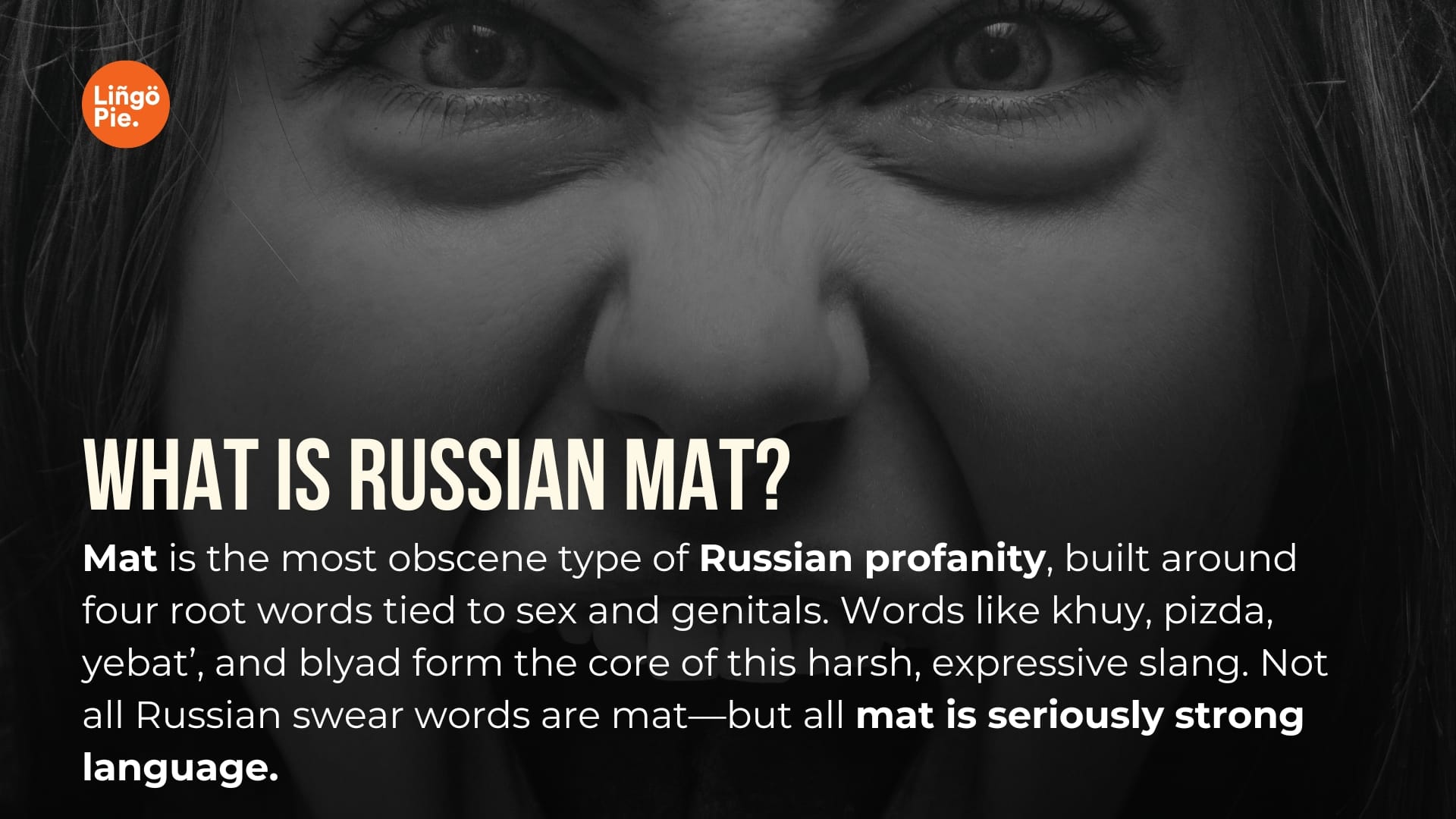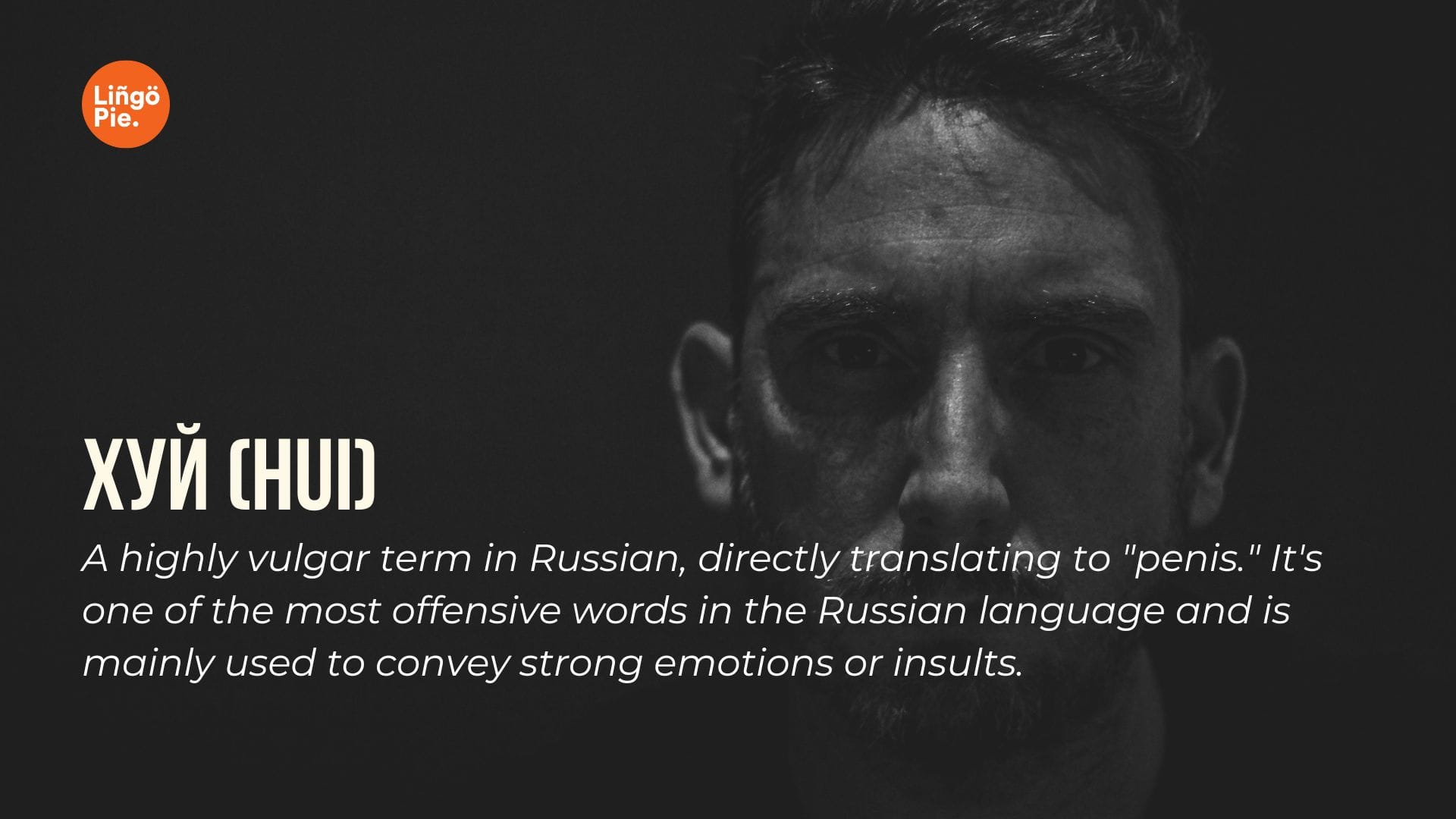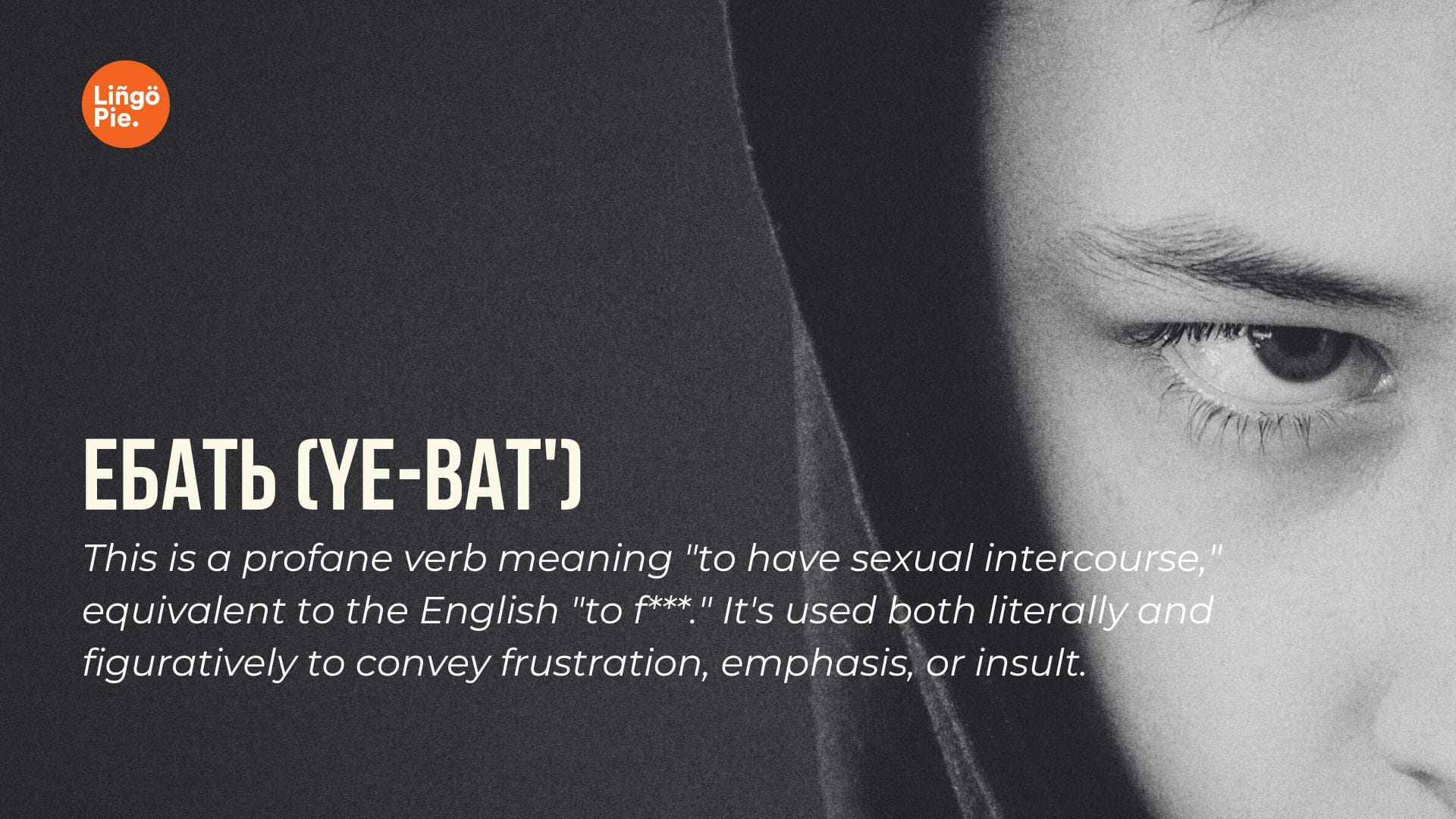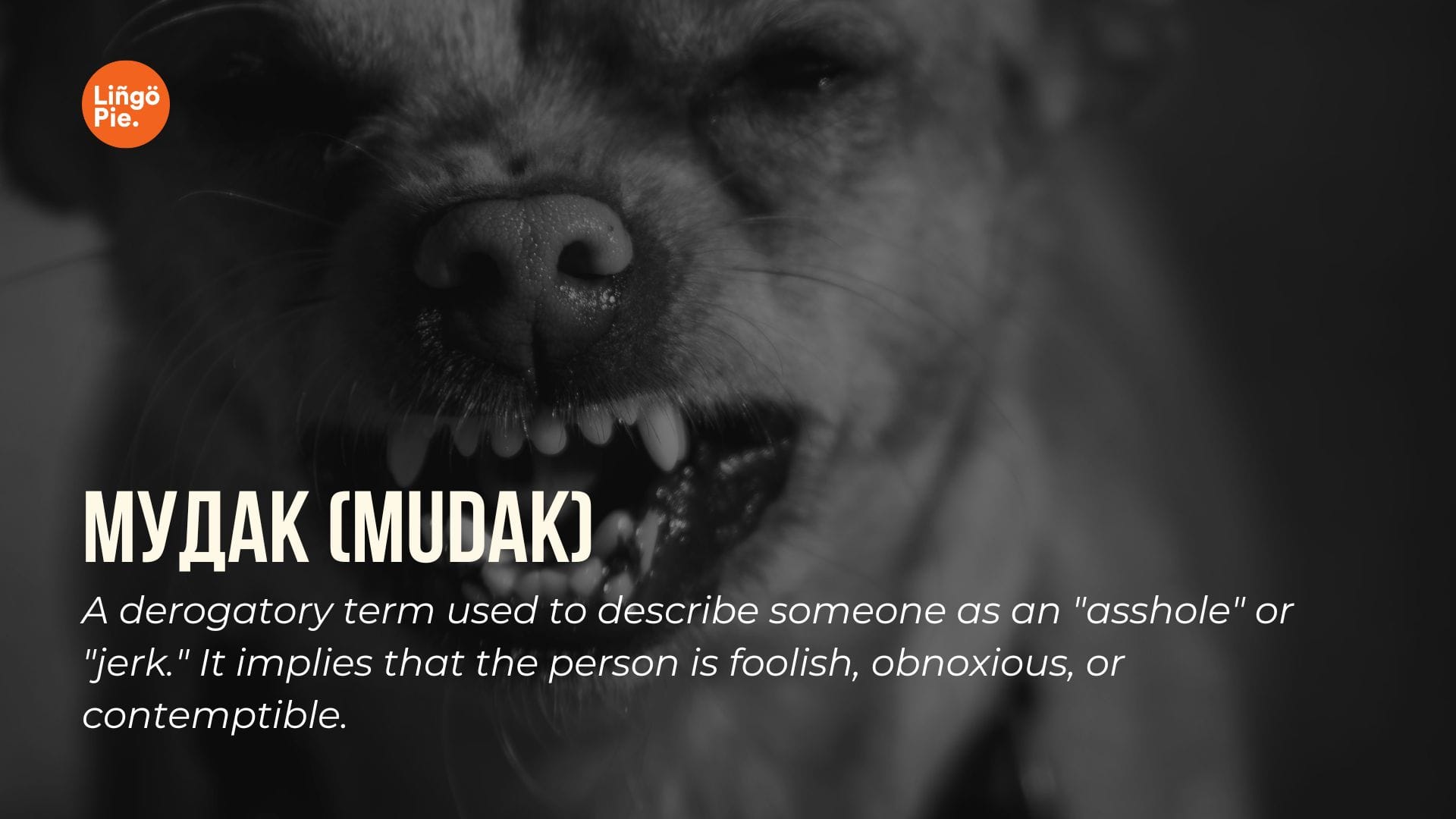Found yourself in a heated conversation with Russian speakers, completely clueless about whether you're being complimented or cursed at? Profanity, known as "mat," is a fascinating and complex part of the Russian language that can catch many learners off guard.
While we seriously don't encourage using Russian swear words and insults in polite company, knowing these expressions is important for understanding Russian culture and recognizing when someone might be directing less-than-friendly words your way.
So without further ado, let's arm you with the common Russian swear words, insults, and curses the locals actually use.
- 7 Best Series to Learn Russian [For Beginners]
- 12 Best Russian Podcasts to Learn Russian
- How To Learn Russian By Yourself [10 Easy Steps]

What is Russian Mat?

Mat (pronounced "maht") is the Russian term specifically for the strongest, most obscene profanity in the Russian language. In 2013, the Russian government media watchdog Roskomnadzor officially defined mat as consisting of four specific lexical roots and all words derived from them:
- khuy (penis)
- pizda (female genitalia)
- yebat' (to have sex)
- blyad (whore)
The act of using mat is described in Russian by expressions such as rugat'sya matom ("to swear using mat"), matom vyrazhat'sya ("to express oneself in mat") or simply materit'sya (to use mat).
While all mat words are swear words, not all Russian swear words are considered mat. Mat is specifically the strongest category of Russian obscenities, with other less severe swear words like suka (bitch), mudak (asshole), zhopa (ass), and govno (shit) not technically falling under the definition of mat, though they're still considered vulgar.
Spicy Russian Swear Words
In this section, we'll explore the everyday curse words that pepper casual Russian conversation. While these words pack a punch, they're considered milder than their more aggressive counterparts.
Иди в баню! (Idi v’banyu!)
This distinctly Russian insult literally means "go to the bathhouse!" but functions as a milder way to tell someone to get lost. Drawing from the cultural importance of the Russian bathhouse (banya) - a place of physical and spiritual cleansing - this phrase carries the weight of telling someone to clear out or leave you alone, similar to saying "take a hike" in English.
While it's considered a relatively mild insult that you might hear in casual settings or even among friends, it still packs enough punch to express genuine annoyance without crossing into truly offensive territory.
Пиздец (pizdets)
Best translated as "total disaster" or "complete mess," this emphatic Russian curse word carries the weight of expressing that a situation has reached its absolute worst point. While extremely common in casual Russian speech, particularly among younger people, it's considered quite vulgar and should be avoided in any professional or formal setting.

Хуй (hui)
One of the most frequently used Russian swear words, hui is an extremely vulgar term for male genitalia (penis). Similar to its English equivalent, it's used in countless expressions and compound swears. While highly offensive on its own, Russians often use it as a versatile building block for more complex profanity, from expressing strong disagreement to showing intense frustration.
Блять (blyat’)
Perhaps the most versatile Russian curse word, blyat' functions similarly to the English F-word as an intensifier or exclamation. It's used to express everything from mild annoyance to extreme anger and can be inserted almost anywhere in a sentence for emphasis.
Засранец (zasranets)
A moderately offensive insult that literally translates to "little shit," zasranets is commonly used to describe someone who's being a troublemaker or a nuisance. While still vulgar, it's considered milder than many other Russian swears and might even be used semi-playfully among close friends, similar to calling someone a "little rascal" but with more bite.

Ебать (ye-bat‘)
This is one of the core Russian profanities, equivalent to the F-word in English. Like its English counterpart, it's extremely versatile and can be used as a verb, exclamation, or basis for compound swears. It's considered highly offensive and is never appropriate in formal settings, though you'll hear it frequently in casual situations among certain groups.
Жопа (zho-pa)
While literally referring to one's ass, zhopa is often used to describe bad situations or incompetent people. It can mean anything from "pain in the ass" to "this situation is terrible," making it a versatile though still inappropriate term in polite company.

Shocking Russian Curse Words
Brace yourself for the heavy artillery of Russian profanity. These words and phrases make up the core of mat - Russia's traditional system of obscene language.
Хуй с горы (hui s’gory)
This colorful Russian insult, literally translating to "dick from the mountain," is used to describe someone who appears out of nowhere and starts causing problems. It's typically directed at an unwanted person who shows up uninvited or someone who intrudes into matters that don't concern them.
Иди на хуй (Idi na hui)
One of the most frequently used Russian curses, this phrase is the equivalent of telling someone to "go fuck yourself" in English. It's a direct, aggressive expression of contempt or dismissal, commonly used in confrontational situations.

Чтоб у тебя хуй во лбу вырос (chtob u tebya hui vo lbu vyros)
This elaborate curse showcases the creative nature of Russian profanity since it means "may a dick grow on your forehead.". It's a colorful way of wishing misfortune on someone, combining absurdist imagery with traditional cursing patterns.
Чтоб тебе дети в суп срали (chtob tebe deti v’sup srali)
Another example of Russia's creative cursing tradition, this phrase represents a category of elaborate curses wishing specific misfortunes on someone. While extremely vulgar, it's often used more for its shocking imagery since it means "may children defecate in your soup."

Hilarious Russian Insults
While still offensive, these expressions often bring a touch of humor to their bite, demonstrating how Russians can turn even their curses into a form of verbal entertainment.
Сволочь (svolotsch’)
A strong insult meaning "scum" or "bastard," svoloch' expresses deep contempt for someone's character. While not technically part of mat (Russian traditional profanity), it's still highly offensive and is used to label someone as morally reprehensible or thoroughly unpleasant. It carries more weight than casual insults and expresses genuine disdain.
Козёл (kozyol)
While literally meaning "goat," kozyol is a common Russian insult typically directed at men to question their character or intelligence. Despite its seemingly innocent literal meaning, it carries significant weight in Russian culture, often implying someone is stubborn, unpleasant, or morally questionable. It's frequently used in confrontational situations but isn't considered as vulgar as mat profanity.

Мудак (mudak)
A highly common Russian insult used to describe someone who's being particularly idiotic or offensive. Think of it as the Russian equivalent of "asshole" but with an added emphasis on stupidity rather than just unpleasant behavior.
Гандон (gandon)
Used as a harsh personal insult, this vulgar term literally refers to a a condom but is used to describe someone who's considered worthless or contemptible. It's a particularly nasty insult in Russian culture, often reserved for expressing genuine hatred or contempt.
Сука (suka)
One of the most internationally recognized Russian swear words thanks to its frequent appearance in media, suka literally means "female dog" but functions similarly to "bitch" in English. It's commonly used to express extreme frustration or to insult someone (particularly women), though in modern usage it's often used regardless of gender.
Enjoying this post? Be sure to check out our other related content!
- 5 Best Russian Documentaries To Watch To Learn Russian
- How To Say I Love You In Russian: 6+ Easy Expressions
- How To Learn Russian Fast: Easy Step-by-Step Guide
A Guide To Russian Profanity Etiquette
Russia takes profanity seriously, with a law specifically targeting the use of mat in public spaces, media, and artistic performances. Since 2014, using mat in media, arts, and public performances can result in significant fines. Even casual usage in public areas like streets, restaurants, or transportation can lead to penalties ranging from 500 to 2,500 rubles.
Penalty Structure:
- Individual citizens: 500-2,500 rubles (approximately $5-25 USD)
- Public officials: 3,000-5,000 rubles (approximately $30-50 USD)
- Legal entities/organizations: 100,000-200,000 rubles (approximately $1,000-2,000 USD)
- Repeat violations can result in higher fines or administrative detention
Understanding these restrictions provides valuable context for how and when you might encounter these words in authentic Russian content.
Hear These Russian Curses in Action
Want to master these Russian expressions and understand how they're used in real-world contexts? There's no better way than immersing yourself in authentic Russian content - and Lingopie has got you covered. Through our extensive collection of Russian TV shows and movies, you'll hear these expressions used naturally by native speakers, complete with proper context, tone, and cultural nuances.
With Lingopie's interactive learning features, you can:
- Watch scenes where these expressions appear in context
- Understand the emotional weight behind each word through real performances
- Learn when and how Russians actually use these phrases in daily life
- Pick up on body language and social cues that accompany these expressions
Ready to dive deeper into the Russian language and culture? Start your language learning journey with Lingopie today and access hundreds of hours of authentic Russian content.
FAQ
What is a popular Russian curse word?
One of the most common Russian curse words is “блядь” (blyat). It’s versatile, vulgar, and used in everything from road rage to comic relief—but definitely not for polite conversation!
What is the Russian word for the F word?
The rough equivalent of the English F-word in Russian is “ёбать” (yebat’). It’s extremely offensive in most contexts and forms the root of many variations in Russian profanity (a.k.a. mat).
What does “Pizdets blyat” mean?
This combo packs a punch. “Пиздец” (pizdets) means something like “total disaster” or “screwed,” and “блядь” (blyat) adds extra emotional weight—think of it like shouting “F*cking hell!” in English.
Is “blyat” a bad word?
Yes. “Blyat” is a strong swear word often shouted in anger or frustration. While widely used, it’s still considered very rude—use it carefully (or better yet, just recognize it when you hear it).
Is “babushka” offensive?
Nope! “Бабушка” (babushka) simply means “grandmother” and isn’t offensive at all. Though, depending on tone or context, it could be used in a teasing way—but it’s generally affectionate.








![Russian Alphabet: Everything You Need to Know [2025]](/blog/content/images/size/w300/2025/04/Russian-alphabet-.jpg)

